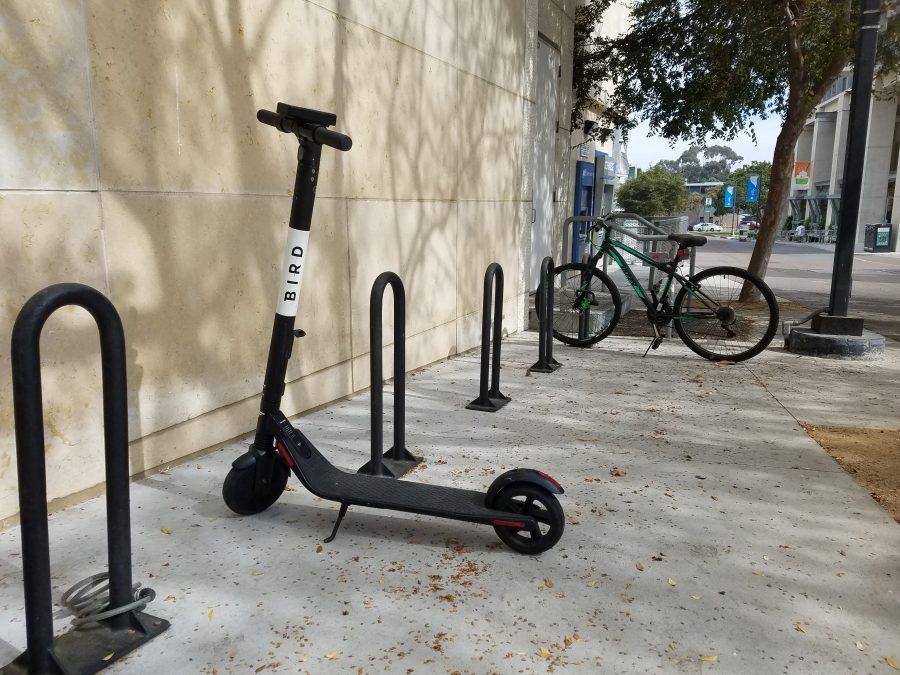The San Diego City Council on Public Safety and Livable Neighborhoods voted on Wednesday, Oct. 24 to move forward with San Diego Mayor Kevin Faulconer’s recent proposal to enforce new safety regulations on dockless scooters, such as Bird scooters.
A popular transportation option among UC San Diego students, Bird scooters are operated via mobile apps, which have built-in QR scanners capable of unlocking and activating the apparatus for a designated amount of time.
Proposed regulations include the lowering of the maximum speed limit from 15 to 8 mph in high-traffic environments, including Mission Beach, Pacific Beach, and La Jolla Beach boardwalks. Additional proposed regulatory frameworks include increased operational safety information for riders, updated liability insurance, and data-sharing features.
San Diego medical authorities are concerned about the rise in scooter-related injuries, given the number of incidents reported this summer.
“It’s just a matter of time before someone is killed,” Chief of medical staff at Scripps Mercy Hospital in San Diego Michael Sise told The Washington Post. “I’m absolutely certain of it.”
Faulconer addressed the dangers posed by electric scooters in a recent statement.
“As with many disruptive new technologies, there are issues that need to be addressed …,” Faulconer said. “First and foremost, public safety is our top priority and that will be reflected in these common-sense regulations.”
The forthcoming regulations won’t affect just the riders — the scooter company’s owners will face their share of increased regulations as well.
Electric scooter companies like Bird must ensure that scooters are clearly marked with a warning against riding on sidewalks and must provide riders with city and state traffic-code guidelines. Scooter companies will also be required to present the city of San Diego with reports on their scooters’ whereabouts and the frequency of their usage on a monthly basis.
The monthly reports will be used in accordance with, and to inform, San Diego’s Climate Action Plan, an initiative devoted to developing policy that will benefit the city’s economy and environment. The group emphasizes a greater reliance on renewable energy and electric transportation.
That list includes creating a renewable energy program, implementing a zero waste plan, and changing policy to have a majority of the city’s fleet be electric vehicles.
Some are doubtful that policy changes alone are the answer to an improved dockless scooter experience. Roger Revelle College senior Amir Haas believes that mechanical fixes should precede policy changes.
“Companies like Bird should be encouraged to refocus on the mechanical aspect of their scooters before facing more policy restrictions,” Haas told the Guardian. “I’ve heard of so many instances of scooters malfunctioning … they should be sturdier. They should have better brakes and accelerator response.”
Greg Block, the mayor’s senior press secretary and public policy manager, explained the extent to which the new regulations will impact UCSD scooter riders.
“The regulations we are proposing won’t have any noticeable impact on campus at UCSD,” Block wrote in an email to the Guardian. “The regulations include geofencing to limit scooter speed in several specific areas in the city (including the beach-area boardwalks and Balboa Park), fees the operators will have to pay, indemnification of the city, data sharing and rider education.”
Block also emphasized the clear divide between city and campus jurisdictions.
“The university is responsible for the streets and sidewalks on campus…,” Block said. “We wouldn’t do anything to regulate on campus. That is the university’s responsibility and prerogative.”
Electric scooters are the current subject of Mayor Faulconer’s proposed regulatory framework, which is anticipated to evolve as the dockless-transportation market expands.
City Council Member Lorie Zapf highlighted San Diego officials’ priorities in a recent press release.
“My goal has always been to slow down the speed of the scooters and address safety concerns,” Zapf said. “With this proposal, I feel confident that we will see changes for the better.”
Mayor Faulconer’s proposal has been months in the making and is designed to ensure improved conditions for both riders and Bird company owners.
photo by Tyler Faurot








